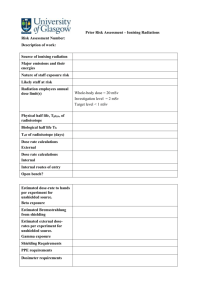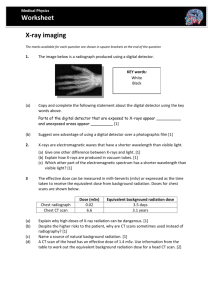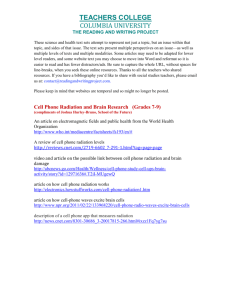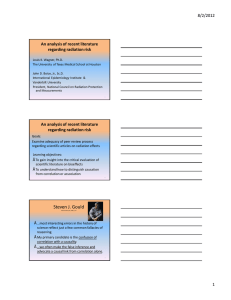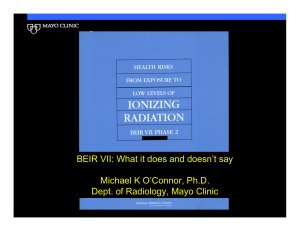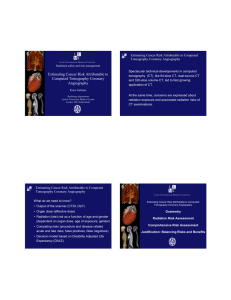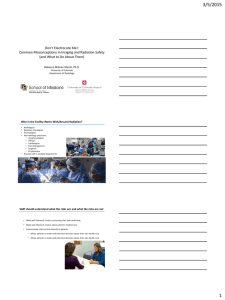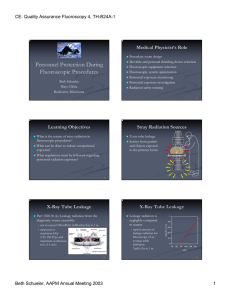2012 AAPM Imaging Educational Course Radiation Risk in Diagnostic Radiology:
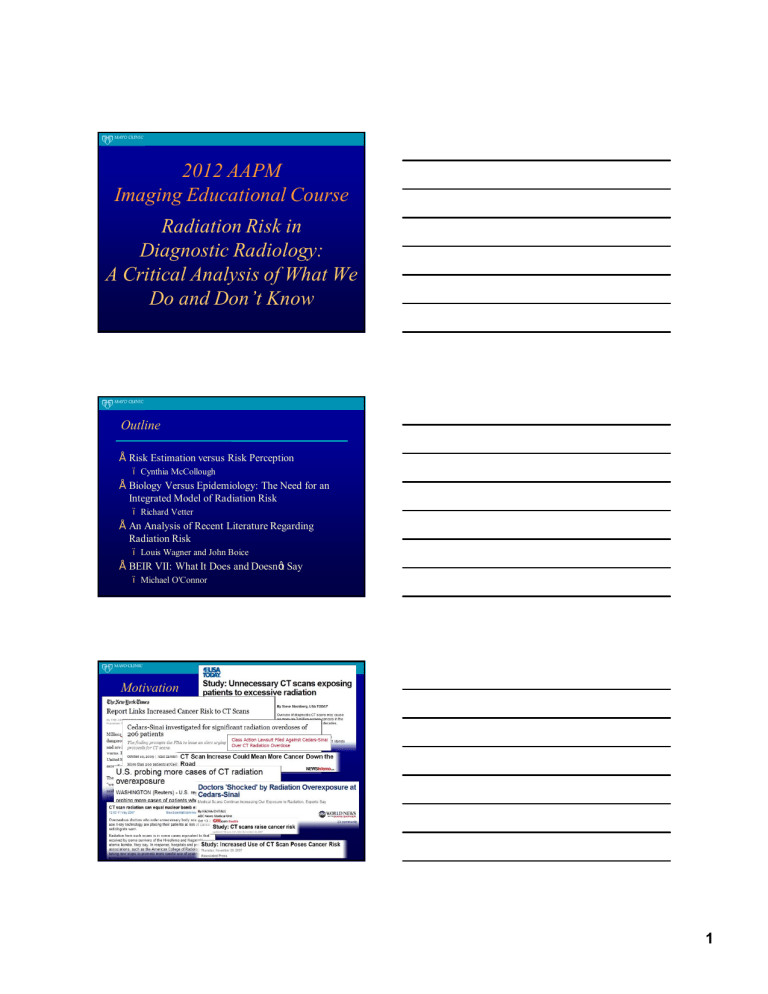
2012 AAPM
Imaging Educational Course
Radiation Risk in
Diagnostic Radiology:
A Critical Analysis of What We
Do and Don’t Know
Outline
•
Risk Estimation versus Risk Perception
– Cynthia McCollough
• Biology Versus Epidemiology: The Need for an
Integrated Model of Radiation Risk
– Richard Vetter
•
An Analysis of Recent Literature Regarding
Radiation Risk
– Louis Wagner and John Boice
•
BEIR VII: What It Does and Doesn’t Say
– Michael O'Connor
Motivation
1
Skin reddening after CT overdose
Hair loss after CT overdose
January 22, 2001
•
Brenner DJ, et al.
Estimated Risks of Radiation-
Induced Fatal Cancer from Pediatric CT, AJR 2001
• “CT scans in children linked to cancer”
– USA Today News
• "Each year, about 1.6 million children in the USA get CT scans to the head and abdomen--and about
1,500 of those will die later in life of radiationinduced cancer, according to research out today."
2
Consequences: Need optimization education
•
Modern medical imaging devices are sophisticated pieces of equipments
•
Multiple parameters with competing effects on image quality and dose
•
Keep doses ALARA
•
Keep benefits AHARA
2
nd
AAPM Summit on CT Dose
Interdisciplinary Program on
Scan Parameter Optimization for
Imaging Physicians, Technologists and Physicists
October 7-8, 2011
Denver, Colorado
Program made possible in part by generous contributions from
ACR, RSNA, and NIBIB
Consequences: Scared and anxious patients
•
Patients and family members seeking expert help after exposures
•
Parents in particular calling, in tears, about “what they have allowed to be done to their child”
•
One recent call, parent experienced 20 lb weight loss and grandparent was calling to get help
3
Consequences: Negative impact on care
•
84 y.o. male
•
Abdominal aortic aneurysm
•
Pre-surgical CT Angiogram ordered
•
Leaves message for physician “ requesting that his
CT ‘with the cancer-causing stuff’ be changed to an ultrasound
”
•
Numerous cancelled appointments after each round of media coverage
Consequences: Can be lethal
•
30 y.o. professional female
•
Pregnant with much anticipated first child
•
Physical exams reveals neck/armpit nodules
•
Chest CT and mammography performed to investigate (fetal dose essentially zero)
•
Mother and father consider “therapeutic abortion” on counsel of (non-Mayo) primary physician
Malformation
Likelihood of having a healthy baby
(i.e. no malformations)
0 mGy 10 mGy 50 mGy 100 mGy
96.00% 95.98% 95.90% 95.80%
From “Exposure to the pregnant patient to diagnostic radiations”, LK Wagner et al. (1997)
4
Difficulties in discussing radiation risk
•
Perception of risk increases when
– I can’t see it
– I can’t touch it
– I can’t measure it
– I can’t control it Electromagnetic Radiation
• Worse still if government or industry controls it
– I’m not familiar with it
– Experts tell me to “trust them”
Fear sells
Difficulties in discussing radiation risk
•
Lack of education or experience regarding radiation
•
Vinegar vs. hydrochloric acid
5
What do our children learn about radiation?
6
What does society “know” about radiation?
It’s bad
Scientific response:
We just need to educate people
7
Natural Background
Reference: Cohen, AJR 2002
Muirhead et al. Br J Cancer 2009;100:206-212
No risk
100
(mSv)
200
Radiology 251 (2009)
Health Physics 99 (2010)
8
Below 100 mSv, risk estimates are meaningless
•
Health Physics Society recommends against quantitative estimation of health risks below an individual dose of 50 mSv in one year or a lifetime dose of 100 mSv (above that received from natural sources)
•
Below 50–100 mSv, risks of health effects are either too small to be observed or are nonexistent
AAPM Position Statement 25 12/13/2011
•
Predictions of hypothetical cancer incidence and deaths in patient populations exposed to such low doses … are highly speculative and should be discouraged.
•
These predictions are harmful because they
– lead to sensationalistic articles in the public media
– cause some … to refuse medical imaging procedures
– placing them at substantial risk by not receiving the clinical benefits of the prescribed procedures
APC = annual percentage change
~ 30% decline in breast cancer mortality attributed to use of screening mammography in women over 40
Tabor et al., Radiology, 2011
“Swedish Two-County Trial: Impact of
Mammographic Screening on Breast
Cancer Mortality during 3 Decades”
Cancer Intervention and Surveillance
Network, NEJM 2005;353:1784
Brown DK, BMJ 2000;321:849
“UK death rates from breast cancer fall by a third”
Peto R et al., Lancet 2000;355:1822
“UK and USA breast cancer deaths down 25% in 2000 at ages 20-69 years
9
This is so logical. Why isn’t it working?
People don’t really think rationally
Especially when it comes to risk
10
Perception of Risk
•
Paul Slovic, Professor of Psychology
• Science
, 1987
•
Psychometric paradigm of risk perception
•
To experts: risk means statistical odds of harm
•
Logical, factual, scientific, quantifiable, data driven
Unknown
Dread
Unknown
Electric fields
DNA technology
Radioactive waste
Nuclear reactor accident
Nuclear weapons fallout
Satellite crashes
Dread
11
Dread
Smoking (disease)
Chainsaws
Motorcycles
Auto accidents
Unknown
Guns
TNT
Risk Estimation (Odds) ≠ Risk Perception
• To public/patients: risk means so much more than odds
–
How bad/ scary is it (impact vs. odds)
– How will it affect my loved ones
–
–
How much control do I have
Can I trust the experts
– Do the experts have my best interest in mind
–
My family and I are too valuable to take chances with
–
Am I “safe”
12
What We Do and Don’t Know about
Radiation Risk in Diagnostic Radiology
•
Risk Estimation versus Risk Perception
– Cynthia McCollough
• Biology Versus Epidemiology: The Need for an
Integrated Model of Radiation Risk
– Richard Vetter
•
An Analysis of Recent Literature Regarding
Radiation Risk
– Louis Wagner and John Boice
• BEIR VII: What It Does and Doesn’t Say
–
Michael O'Connor
13
